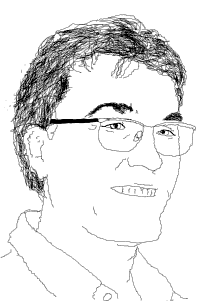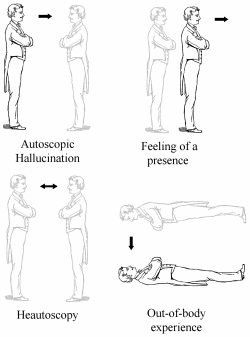Read the whole post.The Ego Tunnel (pt 1)
The denial of one’s own existence might seem a desperate philosophical strategy, but denying the reality of the self is a line which a number of people have taken, and Thomas Metzinger is prominent among them. The thesis of his massive 2003 work is summed up in the title: Being No One: The Self-Model Theory of Subjectivity. In that book, Metzinger made a commendable effort to balance philosophy and science; but the sheer size of the resulting text may have deterred some readers – I confess to being somewhat daunted myself. Now he has come back with a slimmer volume The Ego Tunnel which is aimed at a wider public and raises wider issues which Metzinger suggests need public attention.
Metzinger’s theory – the Self-model Theory of Subjectivity or SMT - suggests that subjective experience is really a kind of trick the brain plays on itself. Our brain sets up a model of the world (actually based on fairly limited data) to which it then adds a model of us, ourselves. The coherence of the model and the fact that the processes supporting it are transparent – ie invisible to us – yield the vivid impression of a self in direct contact with reality, and that’s where subjectivity arises; although in fact the whole thing is simply an illusion.
Metzinger’s view of qualia is characteristically complex. He has a good argument against the existence of what he calls canonical qualia, qualia conceived as subjective universals. He points out that our ability to discriminate is far greater than our ability to recognise. So, if we are presented with examples of green 64 and green 66, we can readily tell the difference: but if at a later stage we are presented with one of the examples, we have no hope of telling which it is. So there is no single thing that consistently goes along with the experience of green 64.
Concluding that at any rate we need to distinguish between ‘qualia’ available to memory and qualia available to the faculty of recognition, Metzinger goes on to distinguish a series of possible conceptions of qualia, ending with ‘Metzinger qualia’ which are available attentionally but not cognitively. These are slippery customers for obvious reasons, impossible to report and broadly ineffable – but then that’s how qualia are generally assumed to be.
Even as a summary, the foregoing is a bare and radically, probably over- simplified view of the theory, however. Metzinger actually presents ten constraints which need to be satisfied for the occurrence of subjective experience: they are:
- Globality; as in ‘global workspace’; conscious items are always integrated into an overall world-model,
- Presentationality; present in the now , temporal immediacy,
- Convolved holism; objects of experience are made up of collections of other objects in a nested hierarchy,
- Dynamicity; the perceived world flows through constant changes,
- Perspectivalness; we experience the world from a point of view,
- Transparency; we cannot see the works – the neural processing which gives rise to our experience is excluded from conscious experience,
- Offline activation; subjective experience is not confined to the live inputs from our senses, a notable exception being dreams, where a whole non-existent world appears.
- Representation of intensities; besides distinguishing between qualia (whichever version we’re dealing with) we can distinguish their levels of intensity,
- Homogeneity; areas of pink, for example, are made up of smaller areas of pink, not red and white at once, and
- Adaptivity; the features of subjective experience have to be things that could reasonably have appeared in the course of evolution.
You may feel that there’s something a bit odd about this list, especially the appearance of ‘adaptivity’. One does not have to be a creationist to feel uneasy about the idea that that is really an essential feature of conscious experience in any deep sense. In a précis which he prepared for a discussion on the Psyche site – sadly this no longer appears to be available – Metzinger discussed only the first six constraints, which suggests that the last four are at least somewhat dispensable. This is a bit confusing – is homogeneity essential to conscious experience, or was that just a kind of bonus, a description of a property of phenomenal experience which is important but not a defining requirement? I think one issue here may be that Metzinger seems to want to do two jobs at once; he wants to explain subjectivity in a philosophical sense, but he also wants to describe and categorise phenomenal experience in a way which can be related to scientific observation, clarifying the puzzling phenomenology of blindsight and other unusual conditions. These are not incompatible aims, exactly, and there’s no absolute reason why one account couldn’t do both, but there is a tension. A robust philosophical explanation would pare down the account to its essentials, while the description of subjectivity seems to be something we would want to do as fully as possible.
And here is part two.
Read the rest of this post.The Ego Tunnel (pt 2)
Among a number of interesting features, The Ego Tunnel includes a substantial account of out-of-body experiences (OBEs) and similar phenomena. Experiments where the subjects are tricked into mistaking a plastic dummy for their real hand (all done with mirrors), or into feeling themselves to be situated somewhere behind their own head (you need a camera for this) show that our perception of our own body and our own location are generated within our brain and are susceptible to error and distortion; and according to Metzinger this shows that they are really no more than illusions (Is that right, by the way - or are they only illusions when they’re wrong or misleading? The fact that a camera can be made to generate false or misleading pictures doesn’t mean that all photographs are delusions, does it?).
There are many interesting details in this account, quite apart from its value as part of the overall argument. Metzinger briefly touches on four varieties of autoscopic (self-seeing) phenomena, all of which can be related to distinct areas of the brain: autoscopic hallucination, where the subject sees an image of themselves; the feeling of a presence, where the subject has the strong sense of someone there without seeing anyone; the particularly disturbing heautoscopy, where the subject sees another self and switches back and forth into and out of it, unsure which is ‘the real me’; and the better-known OBE. OBEs arise in various ways: often detachment from the body is sudden, but in other cases the second self may lift out gradually from the feet, or may exit the corporeal body via the top of the head. Metzinger tells us that he himself has experienced OBEs and made many efforts to have more (going so far as to persuade his anaesthetist to use ketamine on him in advance of an operation, with no result - I wonder whether the anaesthetist actually kept his word) ; speaking of lucid dreams, another personal interest, he tells the story of having one in which he dreamed an OBE. That seems an interesting bit of evidence: if you can dream a credible OBE, mightn’t they all be dreams? This seems to undercut the apparently strong sense of reality which typically accompanies them.
Interestingly, Metzinger reports that a conversation with Susan Blackmore helped him understand his own experiences. Blackmore is of course another emphatic denier of the reality of the self. I don’t in any way mean to offer an ad hominem argument here, but it is striking that these two people both seem to have had a particular interest in ’spooky’ dualistic phenomena which their rational scientific minds ultimately rejected, leading on to an especially robust rejection of the self. Perhaps people who lean towards dualism in their early years develop a particularly strong conception of the self, so that when they adopt monist materialism they reject the self altogether instead of seeking to redefine and accommodate it, as many of us would be inclined to do?
On that basis, you would expect Metzinger to be the hardest of hard determinists; his ideas seem to lean in that direction, but not decisively. He suggests that certain brain processes involved in preparing actions are brought up into the Ego Tunnel and hence seem to belong to us. They seem to be our own thoughts, our own goals and because the earlier stages remain outside the Tunnel, they seem to have come from nowhere, to be our own spontaneous creations. There are really no such things as goals in the world, any more than colours, but the delusion that they do exist is useful to us; the idea of being responsible for our own actions enables a kind of moral competition which is ultimately to our advantage (I’m not quite sure exactly how this works). But in this case Metzinger pulls his punch: perhaps this is not the full story, he says, and describes compatibilism as the most beautiful position.
Metzinger pours scorn on the idea that we must have freedom of the will because we feel our actions to be free, yet he does give an important place to the phenomenology of the issue, pointing out that it is more complex than might appear. The more you look at them, he suggests, the more evasive conscious intentions become. How curious it is then, that Metzinger, whose attention to phenomenology is outstandingly meticulous, should seem so sure that we have at all times a robust (albeit delusional) sense of our selves. I don’t find it so at all, and of course on this no less a person than David Hume is with me; with characteristically gentle but devastating scepticism, he famously remarked “For my part, when I enter most intimately into what I call myself, I always stumble on some particular perception or other, of heat or cold, light or shade, love or hatred, pain or pleasure. I never can catch myself at any time without a perception, and never can observe any thing but the perception.”
Metzinger concludes by considering a range of moral and social issues which he thinks we need to address as our understanding of the mind improves. In his view, for example, we ought not to try to generate artificial consciousness. As a conscious entity, the AI would be capable of suffering, and in Metzinger’s view the chances are its existence would be more painful than pleasant. One reason for thinking so is the constrained and curtailed existence it could expect; another is that we only have our own minds to go on and would be likely to produce inferior, messed-up versions of it. But more alarming, Metzinger argues that human life itself involves an overall preponderance of pain over pleasure; he invokes Schopenhauer and Buddha.


2 comments:
I very much enjoyed your post but am still trying to understand that is meant by "delusion," "real," or "unreal." That is, what would a "real self" look like or feel like? Hasn't Metzinger given an account of what a "self" is, rather than proved that there is no such thing?
Metzinger rejects the whole notion of a self, no matter which definition one uses (and there are many). For a good working definition of a self, check out the work of Antonio Damasio, who I have written about often on this blog.
Post a Comment